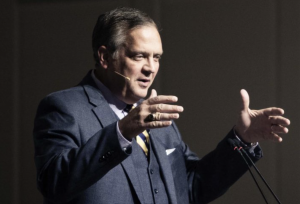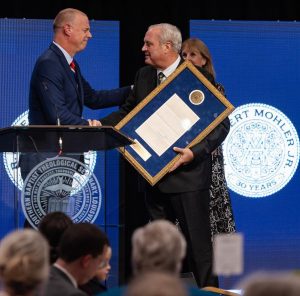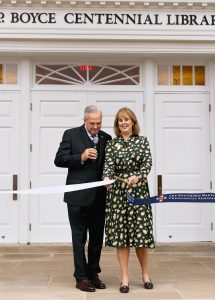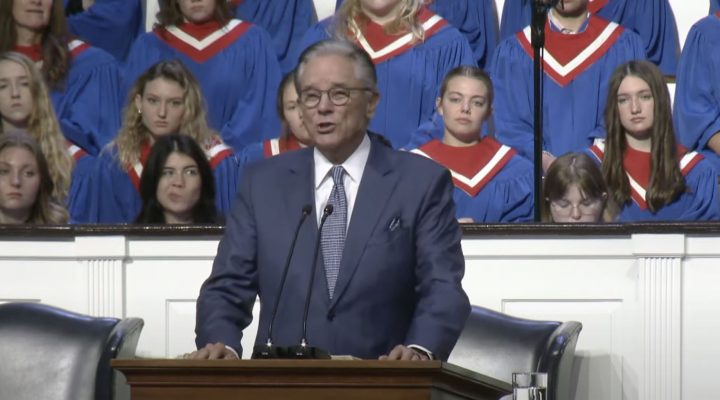On the occasion of Al Mohler’s 30th anniversary as president of Southern Baptist Theological Seminary, O.S. Hawkins compared Mohler to Moses, King David, Paul and Jesus.
“When God chooses to do a work of his sovereign grace, he seems to always choose a man if he chooses to deliver a nation,” said Hawkins, chancellor at Southwestern Baptist Theological Seminary in Fort Worth, Texas. “He picks a Moses and speaks to him from a burning bush and says, ‘Come now and I’ll send you unto Pharaoh to say, “Let my people go.”’ If he decides to establish a nation, he picks a David. If he decides to spread his gospel across a Mediterranean world, he chooses a Paul. And when it came time to rebuild the Southern Seminary, God chose a man. He chose R. Albert Mohler to come to this place.”
The school’s founders and some of its previous presidents “came and they built a seminary,” Hawkins explained. “Al Mohler had to come here and rebuild a seminary.”
Then Hawkins compared Mohler to Jesus.
“I’ve identified three things about him, but long before I ever identified them about him, I identified them in Jesus Christ.”
“What is the secret to the miracle that has taken place on this campus that has literally touched the world, that has sent already multiplied thousands of people all over the world? I’ve identified three things about him, but long before I ever identified them about him, I identified them in Jesus Christ.”
The point of the sermon was to detail three traits of Al Mohler that others should emulate, just as Mohler has been found “imitating Christ,” Hawkins said.
Early opposition
Earlier, Hawkins said Mohler “inherited a faculty most of whom, many of whom at least, discounted most all the miracles of Scripture and would put it in print, would say the burning bush really wasn’t burning when God spoke to Moses through it, that it was probably the fall of the year and the leaves were turning and the wind was blowing through and it gave the appearance of being on fire or that in 2 Kings 5, the ax head didn’t float or in the sacrifice of Isaac … and I could go on and on and on at the discounting of those things.”

Al Mohler (Photo: SBTS)
When he arrived to lead Southern Seminary at age 33, Mohler faced “vicious opposition.”
Hawkins said before Mohler arrived, “only a little more than half of (graduating students) still held that Jesus Christ is the only way to eternal life.”
“He inherited a school where the faith of young people from our churches who were being sent here was being deconstructed before our very eyes,” he said.
Three ways Al Mohler is like Jesus
For the Oct. 17 chapel sermon, Hawkins took his biblical text from the story of the woman at the well in John 4. From this text, Hawkins named three things he believes are true of both Jesus and Mohler: He knew where he was going, he knew who he was, and he knew why he was here.
“He knew which way he was going to turn before he ever got there because like our Lord, he’s known where he was going.”
“The one thing I’ve noticed about Al Mohler is he’s always known where he was going. He’s been a person of vision. He’s never gotten to an intersection of life that I’ve ever seen where he wrung his hands to wonder which way to turn. He knew which way he was going to turn before he ever got there because like our Lord, he’s known where he was going.”
Like Jesus, Mohler knows who he is and has led with “30 years of integrity, 30 years without the hint of scandal, 30 years with nothing but moral and institutional integrity.”
And like Jesus, Mohler has known why he is here, Hawkins continued. “From the first day of Al Mohler’s presidency … he’s been moved and motivated and driven by purpose to do the will of him who sent him to this place.”
He called Mohler a “person of destiny.”
Mohler responds
In response, Mohler reiterated a common theme of his speeches of the past 30 years: “We didn’t have to construct here something that had never been. It’s a part of my stewardship to remind us all that what took place was a recovery of where this institution had been established. We didn’t have to go and devise a confession of faith. It was there right there in the charter. We didn’t have to invent a mechanism for knowing how the faculty was accountable to teach. It was right there in the charter and it didn’t just spring out of nowhere.”
“What took place was a recovery of where this institution had been established.”
The seminary’s task, he said, “is to teach what Christ taught the disciples, the disciples taught the church and what the church has believed on the deposit of an inerrant and infallible Scripture ever since.”
Trustees present resolution
Josh Powell, chairman of the trustee board, lauded Mohler, noting: “It’s quite likely that most of us in this room will never experience a day like this again in our lifetime where we get to celebrate 30 years of leadership here in our seminary.”

Trustee Chairman Josh Powell presents Al Mohler with a resolution of thanks, as Mary Mohler looks on. (SBTS photo)
On behalf of the trustees, Powell presented a resolution to Mohler honoring his 30th anniversary. That resolution says Mohler has “restored Southern Seminary’s confessional commitment to the Bible as the word of God and to the Abstract of Principles and stood as a beacon and steward warding off missional drift.”
Under Mohler’s leadership, more than 15,000 students have graduated from Southern Seminary and its Boyce College. Powell said those graduates represent one-third of the total number of graduates in the seminary’s 164-year history.
Mohler “has faithfully stewarded Southern Seminary’s finances, leading the institution to a position of financial strength, and whereas despite the cultural headwinds that have endangered Christian higher education in the United States, Dr. Mohler continues to lead Southern Seminary and Boyce College with effectiveness, an unwavering conviction to biblical orthodoxy and the resolve to fulfill the institution’s Great Commission mandate,” the resolution continues.
The trustee resolution lauds Mohler’s wife, Mary, “whose influence includes the founding of the Seminary Wives Institute, which has trained thousands of wives for ministry and service.”
Library rededication
As part of the day’s celebrations, seminary leadership rededicated the James P. Boyce Centennial Library, which is undergoing renovations.

Mary Mohler cuts the ribbon for rededication of James P. Boyce Centennial Library. (SBTS photo)
“This building was built in 1959 and has served our seminary very well,” Mohler said. “But the time was ready not just for a renovation of the library but for a refocus of its purpose. When this institution was founded in 1859, James Petigru Boyce said that the priority of the seminary in money was to be ‘brains, books and bricks,’ in that order. This library is important, and these updates reflect a substantial affirmation of that.”
Boyce Library is one of several buildings on campus Black pastors and others concerned about the seminary’s slaveholding founders have sought to get renamed. Both Mohler and trustees have resisted that call, saying the theological orthodoxy of the founders must be honored, even if they were wrong about slavery.
In 2018, the seminary released a 71-page report detailing how its four founders — Boyce, John Broadus, Basil Manly Jr. and William Williams — together enslaved more than 50 people. Boyce served in the Confederate Army and owned a total of 23 slaves.
That fact was not mentioned in the rededication ceremony, based on the seminary’s own news report.
“We don’t need an elaborate ceremony,” Mohler said. “We need to pray for God’s blessing upon this school. I am thankful to God, I am thankful to the board of trustees for its support in this project, and for the financial support to make this possible.”
Trustee Chairman Powell prayed a dedicatory prayer and said: “Southern Seminary is determined to remain an institution dedicated to raising up and training the next generation of pastors and leaders in America and beyond. This improvement in our library is just one example of the school investing in the future.”
Related articles:
Baptist Calvinists defend slavery of Southern Seminary founders
Report laments history of slavery and racism at SBC seminary
When is a ‘prominent’ memorial not as ‘major’ as advertised?
Thirty years later, no one has reshaped the SBC more than Albert Mohler | Analysis by Mark Wingfield
The lion, the witch-hunt and the boardroom: Reflections 30 years after the harrowing of Southern Seminary | Opinion by Brad Bull


